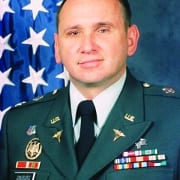Monroe M. Ginsburg
Post: Heritage Post 644 in St. Louis, Missouri
Military Service: U.S. Army
Member Since: 2005
1. Where and when did you serve in the military?
I received a direct commission into the U.S. Army Dental Corps and went on active duty in July 1981. My assignments were Dental Activity at Ft. Bragg, North Carolina from 1981 to 1984, Dental Activity in Bad Toelz, Germany from 1985 to 1987, Dental Activity at Ft. Benning, Georgia from 1988 to 1993, Dental Activity at Ft. Bragg, North Carolina from 1993 to 1995, Dental Activity and Dental Officer for the 86th Combat Support Hospital in Ft. Campbell, KY from 1995 to 1999, the Dental Clinic in St. Louis, Missouri from 1999-200, and Dental Activity at Ft. Leonard Wood, Missouri from 2000-2002. I also deployed to Grenada in 1983 as part of Operation Urgent Fury and Saudi Arabia in 1991 for Operation Desert Storm. I retired from the military in 2003.
2. Why did you join the military?
I come from a strong family tradition of patriotism and American pride. Both my grandfather and father served in the U.S. Army. Many of the dental school faculty at Washington University were retired dental officers or had military experience, which had a positive effect on my decision to join. Lastly, I was looking for an opportunity to get dental practice experience before going into private practice. My family had a very positive experience during my first two tours, so I decided to continue for a full military career.
3. How did your Jewish faith impact your time in the service?
Prior to my military service, my Jewish involvement was at a basic level, with nothing significant after my Bar Mitzvah. That changed when I was asked to be a Jewish lay leader at Ft. Benning in 1988 and received my Jewish Welfare Board (JWB) certification. It was a very rewarding experience to take care of the religious needs of our Jewish military men and women. I also served as the lay leader at Ft. Bragg from 1993 to 1995 and during my deployment for Operation Desert Storm.
Serving as a Jewish lay leader had a profound impact on my overall military experience. One of the highlights of my lay leader experience was during Operation Desert Storm. Our Jewish services were held in Kobar Towers near Dhahran, Saudi Arabia. Religious police roamed the area and severely restricted our public Jewish practice activities, so we had to be discrete about advertising and conducting Jewish religious services. Rabbi Amos Chorny was deployed with us during the High Holidays and Sukkot. As Sukkot approached, Chorny and I secretly built, as far as we know, the only sukkah in Saudi Arabia. It was on the roof of one of the apartment buildings in Kobar Towers. It was a challenge trying to sneak the palm branches we brought in from the desert into the building for the s’chach (roof) of the sukkah. It was a true religious experience for me to sing with our small congregation in our clandestine sukkah while at the same time listening to the Moslem call to worship which could be heard in the surrounding area.
Another lay leader highlight was during a gap between the assignments of rabbis at Ft. Bragg, the division chaplain asked if I would represent the Jewish community and make some comments along with chaplains representing the other religious denominations at the funeral for actress Martha Raye. I was so proud to represent our Jewish community at that occasion.
These experiences significantly strengthened my Jewish pride and involvement and added an important dimension to my military service.
4. Have you ever experienced anti-Semitism at home or abroad?
No.
5. Why did you join JWV?
I joined JWV in 2005. Joe Iken, a member of our shul, invited me to join Heritage Post 644 in St. Louis, Missouri. My father had been a member of JWV in Long Beach, New York, so I was familiar with the organization.
I immediately got involved with Post activities, elected commander a couple of years later, and have been very active since then.
6. How would you improve a current JWV program or what type of program do you think JWV needs to add?
One of my areas of focus is membership. I think our national membership and marketing committees are doing a phenomenal job. At the Post level, we need to keep promoting JWV in our communities. In spite of all our marketing and presence in the community, we still have people tell us they’ve never heard of JWV. With the current guidelines, if an individual has a DD-214 and an honorable discharge, he or she can be a member. We need to remind potential members that it is not a membership requirement that they served in a combat zone or oversees. I get many veterans tell me that they already belong to other organizations and have no time to add another organization. My response is that even if they don’t have time to participate, their membership is important not only at the Post level, but on the National level as well. Their membership helps JWV maintain the leverage it needs to take care of military veterans and support Jewish values.
7. What’s your favorite Jewish food?
Noodle kugel and matzoh brei.




